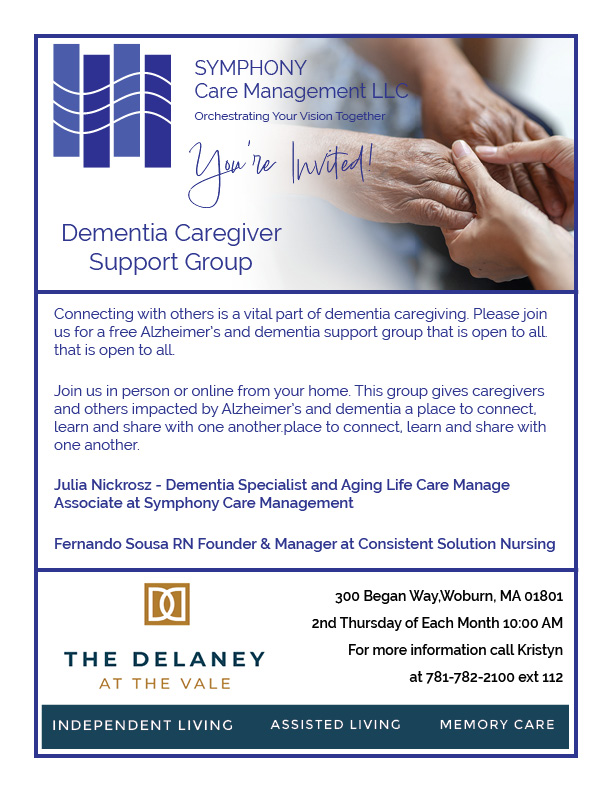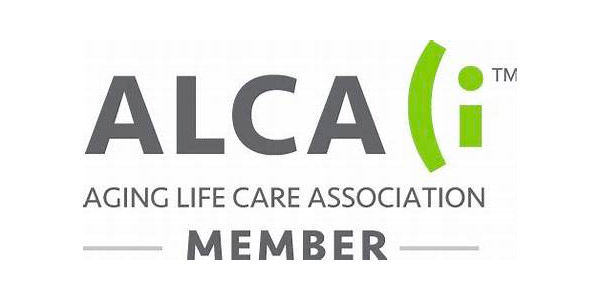
Featured in This Month’s Newsletter
1) Symphony WholeLife Wellness – Joan Harris, LSW, MBA, CMC, Founder, Managing Partner
2) Interview with Kristine Callahan, CPC, CDP, Aging Life Care Manager and Wellness Specialist
3) Medicare Open Enrollment 2025: Re-Evaluate Your Insurance Coverage! – Jean Clements, CDES
4) Brain Health: The NPI-Q and Specialized Dementia Caregiver Coaching with Julia Nickrosz, CDP
5) Reminder: Flu Vaccines – Are You Up-to-Date on all Your Vaccine Protection?
6) Wellness Spotlight: Better Sleep Tips – Kristine Callahan, CPC, CDP
7) Save the Date: Tuesday November 18, 2025 – Stress Management Workshop for Caregivers: Toolkit for Self-Care
8) Monthly Caregiver Support Group
Symphony WholeLife Wellness

Joan Harris, LSW, MBA, CMC
Hello Friends,
In June, I wrote to you about my journey with elder care colleagues to Japan staying in Ogimi Village in Okinawa, Japan, one of the 5 Blue Zones in the world with elders who are being studied not just for longevity but for living healthy joyful lives. Learning directly from them what makes their life meaningful and fulfilling and experiencing their joyfulness brought about a transformation of Symphony Care Management. As Aging Life Care Managers, we focus on the client’s goals, safety, and function. We lend our expertise to assist our clients and their families to reach those goals which vary dramatically throughout different stages of aging. Although this continues to be our role, the heart of our practice and all that we do brings us back to the question, “How can we improve the quality of our client’s lives as well as their caregivers?” Supporting our client to redefine their purpose, create a renewed sense of community, participate in meaningful engagement, and find true peace and comfort is our mission. Equally as important is for our practice to address in a significant life changing way our family caregiver’s need to regain and maintain their wellness. November is National Family Caregiver’s Month. I can’t imagine a better or more opportune moment to announce the development and launch of Symphony WholeLife Wellness.
What does this mean? WholeLife Wellness means simply that we support the whole person. This includes physical and cognitive health, emotional wellbeing, spiritual and personal purpose as well as environmental comfort and what brings our clients peace. When we start our work with an older adult, we do an in depth “Life Narrative.” We want to know who our clients are and what makes their lives meaningful. What was their line of work, hobbies, passions? Who are the people in their lives that matter most and how often do they participate in activities they love that make them feel like themselves?
We have brought onto our team Kristine Callahan, CPC, CDP, an exceptionally experienced elder care professional who is a certified professional coach, certified dementia practitioner, end of life specialist, and Reiki Master Teacher to facilitate the Symphony WholeLife assessments and development of an individualized plan. This plan will support our clients reaching their defined goals to improve their quality of life. We know that caregiving can be isolating, and exhausting physically and emotionally. It is well studied and documented that family caregivers can be at extreme risk of physical and psychological illnesses because they can no longer practice self-care. We are excited to offer this Symphony WholeLife Wellness to our client’s family caregivers as well.
Our WholeLife Wellness program will integrate with our Aging GPS program, high level Care Management Services and Dementia Specialty. Personalized visits will offer: energy healing, aroma therapy with essential oils, referrals to gentle movement, expressive art therapy, spiritual care, family coaching and respite planning for caregiver wellness, thoughtful planning around nutrition, quality sleep and a daily rhythm that support our client’s wellness as just some examples. Kristine Callahan will provide full-service Care Management as well as Symphony WholeLife Wellness in the Greater Boston area as well as Cape Cod.
Please join me in welcoming Kristine and watch my interview with her to learn more about Symphony WholeLife Wellness.
Medicare Open Enrollment

Jean Clements, CDES (Certified Dementia Engagement Specialist), Practice Manager
As we welcome Autumn, I hope you are all enjoying this beautiful time of year. Each fall, our priority is to assist our clients with Medicare Open Enrollment, which runs from October 15, 2025 to December 7, 2025.
Medicare Open Enrollment is crucial because many individuals initially sign up for Medicare Part A (Hospital) and Part B (Outpatient medical care coverage), a self-pay Medigap Policy to cover the 20% not covered by Medicare, and a Medicare Part D Prescription Plan. Alternatively, some opt for a Medicare Advantage Plan (Medicare Part C). Often, people do not re-evaluate their chosen plan years later, assuming it still meets their needs. The process can seem overwhelming and complicated.
In our work as Care Managers, we often engage with clients and their families’ decades after they first selected a health plan. We frequently observe that clients’ needs have changed, and their current health plans no longer provide adequate coverage. For example, some Managed Care Plans limit choices because they only contract with specific nursing and rehabilitation facilities, and many facilities will not accept clients with these types of insurance. Additionally, we have seen instances where clients are discharged sooner from hospitals or receive shorter home health care approvals when the insurance company’s utilization reviewer makes that decision.
The good news is that the State of Massachusetts offers a free health insurance consultation program called SHINE: Serving the Health Insurance Needs of Everyone. You can find more information at [https://www.mass.gov/info-details/serving-the-health-insurance-needs-of-everyone-shine-program}.
Every Senior Center in Massachusetts has trained SHINE volunteers. You or your family member can call your local city or town’s Senior Center (Council on Aging) to schedule an appointment (in person or by phone) with a SHINE volunteer. They will help you log into your Medicare.gov account, review your current plan, assess your coverage needs, and evaluate your prescription medications. They will provide immediate consultation and assist with enrollment, simplifying the entire process.
We encourage you to schedule an appointment with a SHINE volunteer to ensure you have the necessary coverage and the best choices available for care when health issues arise.
We can also assist if you need help scheduling an appointment or need transportation to an appointment. Contact us at your earliest convenience as appointments tend to fill up quickly
How Can The NPI-Q with Specialized Dementia Caregiver Coaching Assist your Professional Team in the Management and Treatment of Behaviors Caused by Alzheimer’s Disease and Related Dementias?

Julia Nickrosz, CDP, Aging Life Care Manager, Dementia Specialists and Caregiver Coach
The Neuropsychiatric Inventory Questionnaire (NPI-Q) is a brief, caregiver-completed tool designed to track behavioral and emotional changes in individuals living with dementia. Covering twelve domains—delusions, hallucinations, agitation/aggression, depression/dysphoria, anxiety, elation/euphoria, disinhibition, apathy/indifference, irritability/lability, aberrant motor behavior, sleep/nighttime disturbances, and appetite/eating changes—the NPI-Q captures whether symptoms are present, their severity, and the caregiver’s distress. Completing the questionnaire usually takes less than ten minutes but provides valuable insight for clinicians and care teams, enabling identification of patterns, monitoring changes over time, and informing more personalized care decisions.
Regular use of the NPI-Q offers multiple benefits, including early recognition of behavioral changes, guidance for therapeutic and medication interventions, monitoring treatment effectiveness, and enhancing communication between families, caregivers, and clinicians. For example, documenting delusions or hallucinations helps caregivers validate experiences while ensuring safety, whereas tracking agitation, irritability, or disinhibition can highlight triggers and inform strategies for de-escalation. Similarly, monitoring depression, anxiety, or apathy guides engagement in meaningful activities, while sleep and appetite changes point to interventions supporting overall well-being and daily functioning.
Caregiver coaching offered by SCM is a helpful complement to NPI-Q tracking, equipping families with strategies to respond to behaviors effectively, tailor interventions to the individual, and maintain a calm, predictable environment. Coaching teaches families to redirect attention safely during agitation, provide structured routines for sleep or appetite changes, support engagement for apathy, and manage mood fluctuations such as elation or irritability. It emphasizes validating feelings without reinforcing harmful beliefs, offering gentle reassurance, and creating personalized, meaningful interventions for each domain.
Together, the NPI-Q and caregiver coaching create a structured approach that transforms unpredictable behavioral changes into actionable insights. By systematically tracking symptoms across all twelve domains and applying individualized strategies, families can better anticipate needs, reduce caregiver stress, improve safety, and enhance the quality of life for their loved one living with dementia. This combination empowers caregivers, promotes person-centered care, and fosters collaboration with clinicians to ensure interventions are timely, effective, and compassionate.
Reference: For inquiries regarding the NPI-Q, contact: Jeffrey L. Cummings, MD Mary S. Easton Center for Alzheimer’s Disease Research 10911 Weyburn Ave; #200 Los Angeles, CA 90095
jcummings@mednet.ucla.edu
The NPI-Q can be found at: www.NPItest.net
Vaccine Reminder Checklist

Check with your Primary Care Physician to get a list of the vaccines you need to stay healthy throughout the winter months.
Flu Vaccine:
Often the Flu vaccine is given at your Dr’s office. If you are not scheduled to see your Primary Care Physician in October, you can get the Flu vaccine at the pharmacy. CDC States: “Ideally, everyone should be vaccinated by the end of October.”
If you need assistance scheduling an appointment at your local pharmacy or require transportation to an appointment, please contact us.
From the CDC: Center for Disease Control: Take time to get a flu vaccine.
- Everyone 6 months and older should get a flu vaccine every season, especially people at higher risk.
- CDC recommends a yearly flu vaccine as the first and most important action in reducing your risk of flu and its potentially serious outcomes.
- For 2025-2026 flu season, CDC recommends seasonal flu vaccination for children, pregnant women, and adults with only single-dose formulations of flu vaccine that are free of thimerosal as a preservative.
- Flu vaccines help to reduce the burden of flu illnesses, hospitalizations and deaths on the health care system each year. (Read more about flu vaccine benefits.)
- Flu vaccination also has been shown to reduce the severity of illness in people who get vaccinated but still get sick.
- All flu vaccines are designed to protect against three influenza viruses (Visit Vaccine Virus Selection for this season’s vaccine composition.)
- Everyone 6 months and older should get an annual flu vaccine, ideally by the end of October but people should continue to get vaccinated as long as flu viruses pose a threat to their community.
- Vaccination of people at higher risk of developing serious flu complications is especially important to decrease their risk of severe flu illness.
- People at higher risk of serious flu complications include young children, pregnant women, people with certain chronic health conditions like asthma, diabetes or heart and lung disease, and people 65 years and older.
Wellness Spotlight: Non-pharmacological Tips to Improve Sleep Patterns

Kristine Callahan, CPC, CDP, Aging Life Care Manager and Wellness Specialist
Sleep is the most vital tool for wellness we have access to. For some it can be so easy. For others sleep can be sporadically challenging, a constant battle or forever elusive. Sleep is our body’s natural medicine. Without restorative sleep our bodies cannot replenish themselves from the day. We often end up fatigued or experiencing other symptoms including pain and stiffness from increased inflammation in our joints, mood changes, and brain fog. Restorative sleep impacts your memory.
The biggest cause of disrupted sleep is stress. I am looking forward to hosting a special presentation for stress management next month. It will share some vital self-healing techniques to take charge of your nervous system regulation.
Here are a few non-pharmacological tips to improve sleep patterns. Some of these tips may seem obvious, but they are a good reminder.
- Try to go to bed at the same time each night, and create a system of waking at the same structured time to create a reliable pattern for your body.
- I highly recommend avoiding heavy meals before bed, caffeine and stimulants including high sugar content fruits, juices, or chocolate.
- Limit watching anything disturbing before bed.
- Shut down all electronics one hour before bed.
- Reduce any and all blue light in your bedroom.
- Try a new nighttime ritual of recalling joyful memories, try herbal teas, calming essential oils, magnesium supplements, listen to a guided meditation, read, or journal.
- Create a nurturing environment with the room as dark as safely possible.
- Replace your mattress if needed.
I hope these tips are helpful and if you would like to explore working with me through
our new Symphony WholeLife Wellness program click here book a consultation.
Virtual Workshop: Stress Management Tools for Caregivers.

Tuesday, November 18th: 11am – 12:30
Learn to take charge of your day to day demands with these self-guided stress management skills.
Learn to Self-Assess & Shift Your Energy
Establish a Daily Practice of Self-Care
Create a Self-Care Tool Kit
Develop the Skills to Navigate Your Personal Stress Triggers
Using a daily practice of good personal energy hygiene will help you reduce stress and live a more balanced life. Your well-being has a ripple effect to those you surround yourself with.
We look forward to you joining us for this special workshop.
To Sign Up:
Please email Ann Cardenas at The Delaney: CardenasAnn@delaneyatthevale.com • 781-782-2100 X 133




